Analysis of ACCC v TPG Internet Pty Ltd: Business Law Report
VerifiedAdded on 2020/03/23
|9
|1734
|28
Report
AI Summary
This report provides a comprehensive analysis of the ACCC v TPG Internet Pty Ltd case, focusing on the legal implications of misleading and deceptive advertising under the Trade Practices Act 1974. The report examines the facts of the case, the arguments presented by the ACCC, and the court's reasoning at both the primary judge and Full Court levels. It delves into the High Court's decision, highlighting the key disagreements with the Full Court's interpretation and the court's ultimate ruling. The analysis covers the application of sections 52 and 53C(1)(c) of the Act, the concept of the 'dominant message' in advertising, and the importance of considering the target audience's knowledge. The report also explores the impact of the ruling on advertising campaigns and the need for compliance with consumer protection laws, referencing relevant case law and legal principles to provide a thorough understanding of the case's significance in business law.

Running head: BUSINESS LAW
Business Law
Name of the Student
Name of the University
Author Note
Business Law
Name of the Student
Name of the University
Author Note
Paraphrase This Document
Need a fresh take? Get an instant paraphrase of this document with our AI Paraphraser
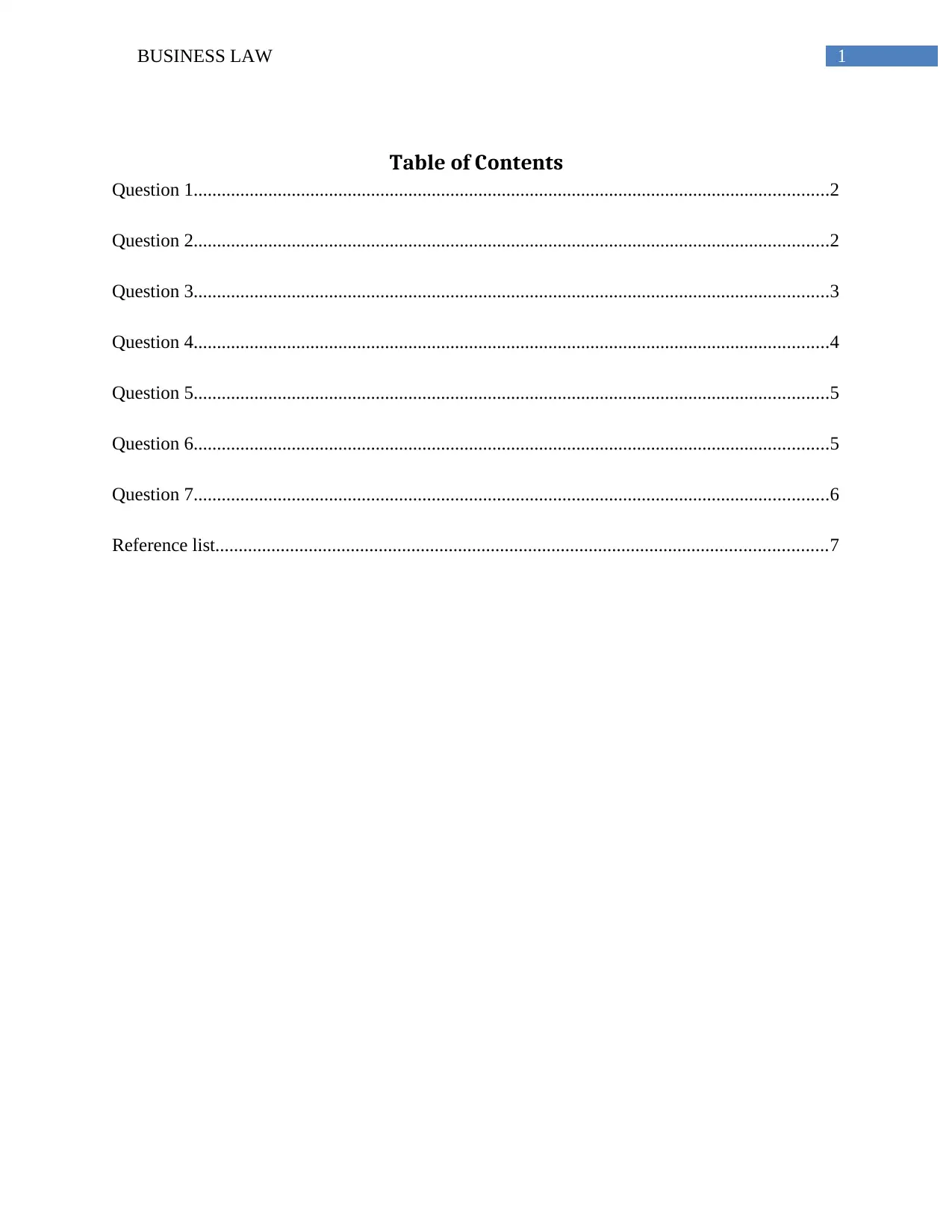
1BUSINESS LAW
Table of Contents
Question 1........................................................................................................................................2
Question 2........................................................................................................................................2
Question 3........................................................................................................................................3
Question 4........................................................................................................................................4
Question 5........................................................................................................................................5
Question 6........................................................................................................................................5
Question 7........................................................................................................................................6
Reference list...................................................................................................................................7
Table of Contents
Question 1........................................................................................................................................2
Question 2........................................................................................................................................2
Question 3........................................................................................................................................3
Question 4........................................................................................................................................4
Question 5........................................................................................................................................5
Question 6........................................................................................................................................5
Question 7........................................................................................................................................6
Reference list...................................................................................................................................7
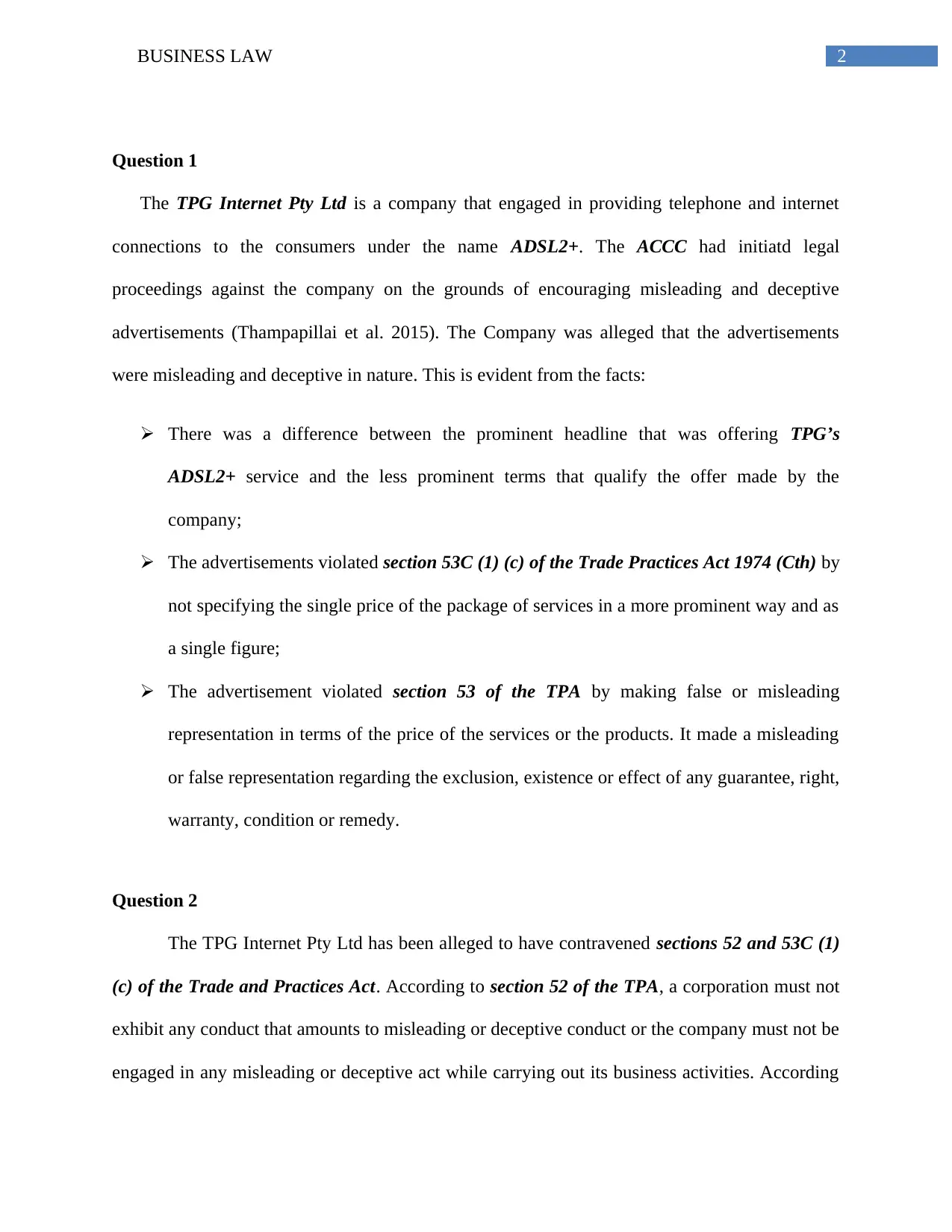
2BUSINESS LAW
Question 1
The TPG Internet Pty Ltd is a company that engaged in providing telephone and internet
connections to the consumers under the name ADSL2+. The ACCC had initiatd legal
proceedings against the company on the grounds of encouraging misleading and deceptive
advertisements (Thampapillai et al. 2015). The Company was alleged that the advertisements
were misleading and deceptive in nature. This is evident from the facts:
There was a difference between the prominent headline that was offering TPG’s
ADSL2+ service and the less prominent terms that qualify the offer made by the
company;
The advertisements violated section 53C (1) (c) of the Trade Practices Act 1974 (Cth) by
not specifying the single price of the package of services in a more prominent way and as
a single figure;
The advertisement violated section 53 of the TPA by making false or misleading
representation in terms of the price of the services or the products. It made a misleading
or false representation regarding the exclusion, existence or effect of any guarantee, right,
warranty, condition or remedy.
Question 2
The TPG Internet Pty Ltd has been alleged to have contravened sections 52 and 53C (1)
(c) of the Trade and Practices Act. According to section 52 of the TPA, a corporation must not
exhibit any conduct that amounts to misleading or deceptive conduct or the company must not be
engaged in any misleading or deceptive act while carrying out its business activities. According
Question 1
The TPG Internet Pty Ltd is a company that engaged in providing telephone and internet
connections to the consumers under the name ADSL2+. The ACCC had initiatd legal
proceedings against the company on the grounds of encouraging misleading and deceptive
advertisements (Thampapillai et al. 2015). The Company was alleged that the advertisements
were misleading and deceptive in nature. This is evident from the facts:
There was a difference between the prominent headline that was offering TPG’s
ADSL2+ service and the less prominent terms that qualify the offer made by the
company;
The advertisements violated section 53C (1) (c) of the Trade Practices Act 1974 (Cth) by
not specifying the single price of the package of services in a more prominent way and as
a single figure;
The advertisement violated section 53 of the TPA by making false or misleading
representation in terms of the price of the services or the products. It made a misleading
or false representation regarding the exclusion, existence or effect of any guarantee, right,
warranty, condition or remedy.
Question 2
The TPG Internet Pty Ltd has been alleged to have contravened sections 52 and 53C (1)
(c) of the Trade and Practices Act. According to section 52 of the TPA, a corporation must not
exhibit any conduct that amounts to misleading or deceptive conduct or the company must not be
engaged in any misleading or deceptive act while carrying out its business activities. According
⊘ This is a preview!⊘
Do you want full access?
Subscribe today to unlock all pages.

Trusted by 1+ million students worldwide
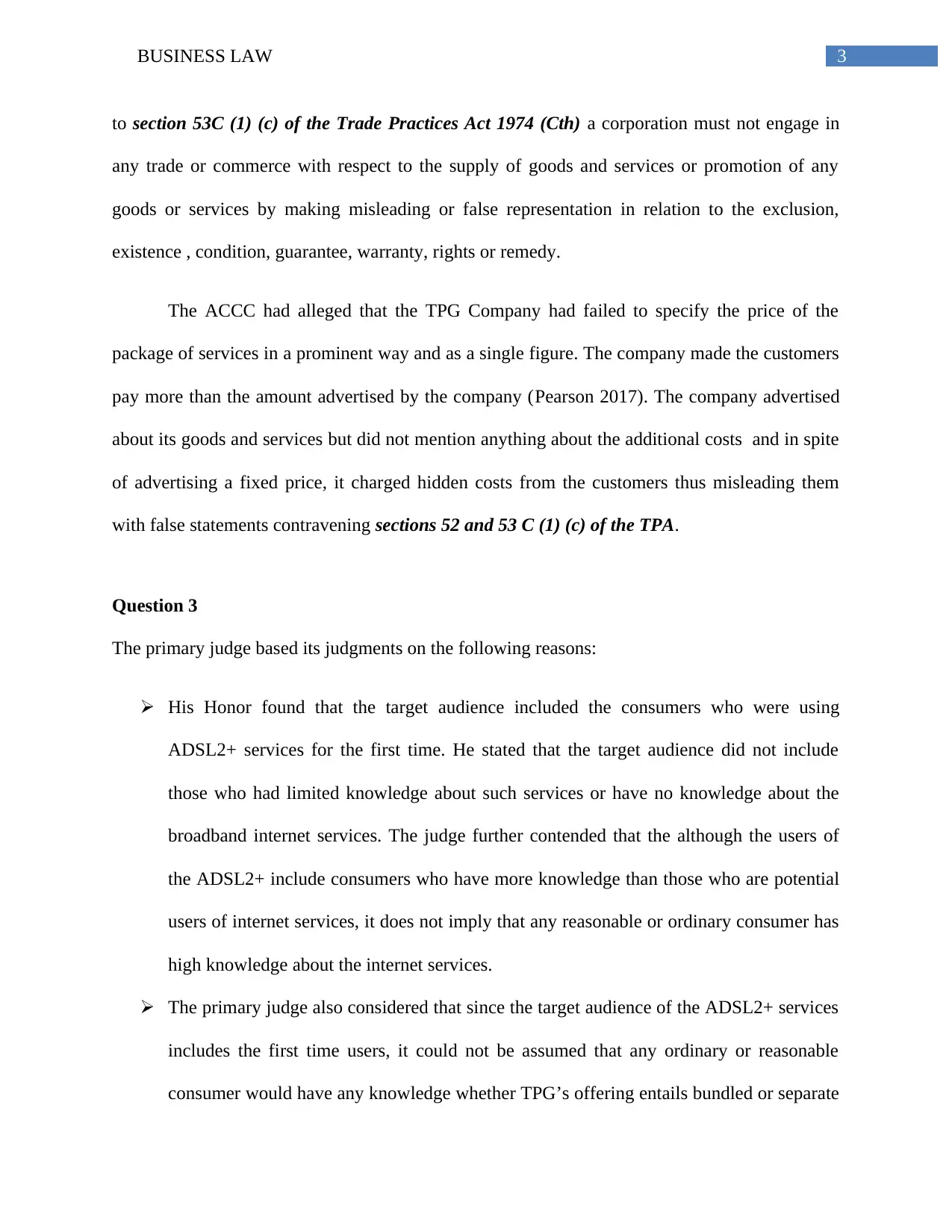
3BUSINESS LAW
to section 53C (1) (c) of the Trade Practices Act 1974 (Cth) a corporation must not engage in
any trade or commerce with respect to the supply of goods and services or promotion of any
goods or services by making misleading or false representation in relation to the exclusion,
existence , condition, guarantee, warranty, rights or remedy.
The ACCC had alleged that the TPG Company had failed to specify the price of the
package of services in a prominent way and as a single figure. The company made the customers
pay more than the amount advertised by the company (Pearson 2017). The company advertised
about its goods and services but did not mention anything about the additional costs and in spite
of advertising a fixed price, it charged hidden costs from the customers thus misleading them
with false statements contravening sections 52 and 53 C (1) (c) of the TPA.
Question 3
The primary judge based its judgments on the following reasons:
His Honor found that the target audience included the consumers who were using
ADSL2+ services for the first time. He stated that the target audience did not include
those who had limited knowledge about such services or have no knowledge about the
broadband internet services. The judge further contended that the although the users of
the ADSL2+ include consumers who have more knowledge than those who are potential
users of internet services, it does not imply that any reasonable or ordinary consumer has
high knowledge about the internet services.
The primary judge also considered that since the target audience of the ADSL2+ services
includes the first time users, it could not be assumed that any ordinary or reasonable
consumer would have any knowledge whether TPG’s offering entails bundled or separate
to section 53C (1) (c) of the Trade Practices Act 1974 (Cth) a corporation must not engage in
any trade or commerce with respect to the supply of goods and services or promotion of any
goods or services by making misleading or false representation in relation to the exclusion,
existence , condition, guarantee, warranty, rights or remedy.
The ACCC had alleged that the TPG Company had failed to specify the price of the
package of services in a prominent way and as a single figure. The company made the customers
pay more than the amount advertised by the company (Pearson 2017). The company advertised
about its goods and services but did not mention anything about the additional costs and in spite
of advertising a fixed price, it charged hidden costs from the customers thus misleading them
with false statements contravening sections 52 and 53 C (1) (c) of the TPA.
Question 3
The primary judge based its judgments on the following reasons:
His Honor found that the target audience included the consumers who were using
ADSL2+ services for the first time. He stated that the target audience did not include
those who had limited knowledge about such services or have no knowledge about the
broadband internet services. The judge further contended that the although the users of
the ADSL2+ include consumers who have more knowledge than those who are potential
users of internet services, it does not imply that any reasonable or ordinary consumer has
high knowledge about the internet services.
The primary judge also considered that since the target audience of the ADSL2+ services
includes the first time users, it could not be assumed that any ordinary or reasonable
consumer would have any knowledge whether TPG’s offering entails bundled or separate
Paraphrase This Document
Need a fresh take? Get an instant paraphrase of this document with our AI Paraphraser
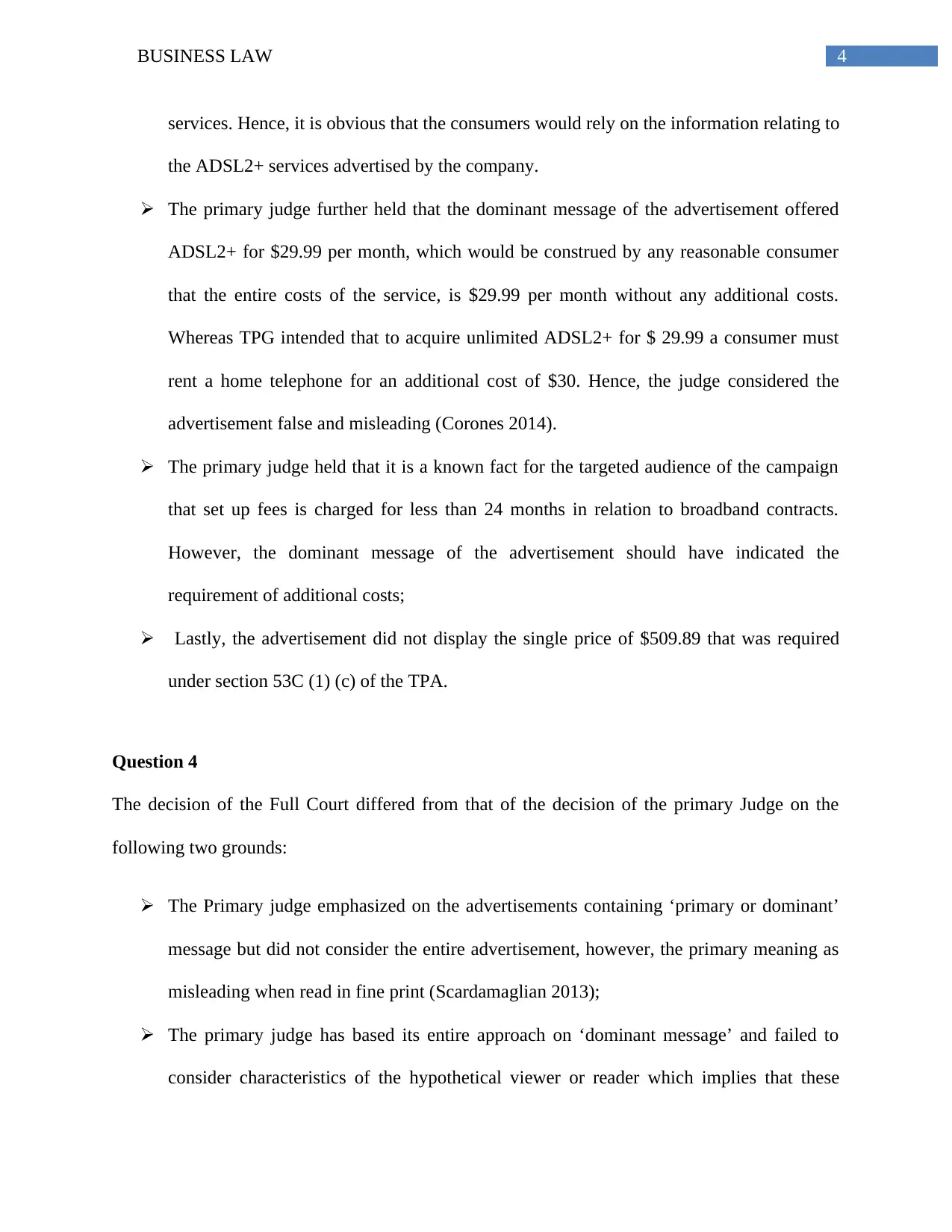
4BUSINESS LAW
services. Hence, it is obvious that the consumers would rely on the information relating to
the ADSL2+ services advertised by the company.
The primary judge further held that the dominant message of the advertisement offered
ADSL2+ for $29.99 per month, which would be construed by any reasonable consumer
that the entire costs of the service, is $29.99 per month without any additional costs.
Whereas TPG intended that to acquire unlimited ADSL2+ for $ 29.99 a consumer must
rent a home telephone for an additional cost of $30. Hence, the judge considered the
advertisement false and misleading (Corones 2014).
The primary judge held that it is a known fact for the targeted audience of the campaign
that set up fees is charged for less than 24 months in relation to broadband contracts.
However, the dominant message of the advertisement should have indicated the
requirement of additional costs;
Lastly, the advertisement did not display the single price of $509.89 that was required
under section 53C (1) (c) of the TPA.
Question 4
The decision of the Full Court differed from that of the decision of the primary Judge on the
following two grounds:
The Primary judge emphasized on the advertisements containing ‘primary or dominant’
message but did not consider the entire advertisement, however, the primary meaning as
misleading when read in fine print (Scardamaglian 2013);
The primary judge has based its entire approach on ‘dominant message’ and failed to
consider characteristics of the hypothetical viewer or reader which implies that these
services. Hence, it is obvious that the consumers would rely on the information relating to
the ADSL2+ services advertised by the company.
The primary judge further held that the dominant message of the advertisement offered
ADSL2+ for $29.99 per month, which would be construed by any reasonable consumer
that the entire costs of the service, is $29.99 per month without any additional costs.
Whereas TPG intended that to acquire unlimited ADSL2+ for $ 29.99 a consumer must
rent a home telephone for an additional cost of $30. Hence, the judge considered the
advertisement false and misleading (Corones 2014).
The primary judge held that it is a known fact for the targeted audience of the campaign
that set up fees is charged for less than 24 months in relation to broadband contracts.
However, the dominant message of the advertisement should have indicated the
requirement of additional costs;
Lastly, the advertisement did not display the single price of $509.89 that was required
under section 53C (1) (c) of the TPA.
Question 4
The decision of the Full Court differed from that of the decision of the primary Judge on the
following two grounds:
The Primary judge emphasized on the advertisements containing ‘primary or dominant’
message but did not consider the entire advertisement, however, the primary meaning as
misleading when read in fine print (Scardamaglian 2013);
The primary judge has based its entire approach on ‘dominant message’ and failed to
consider characteristics of the hypothetical viewer or reader which implies that these
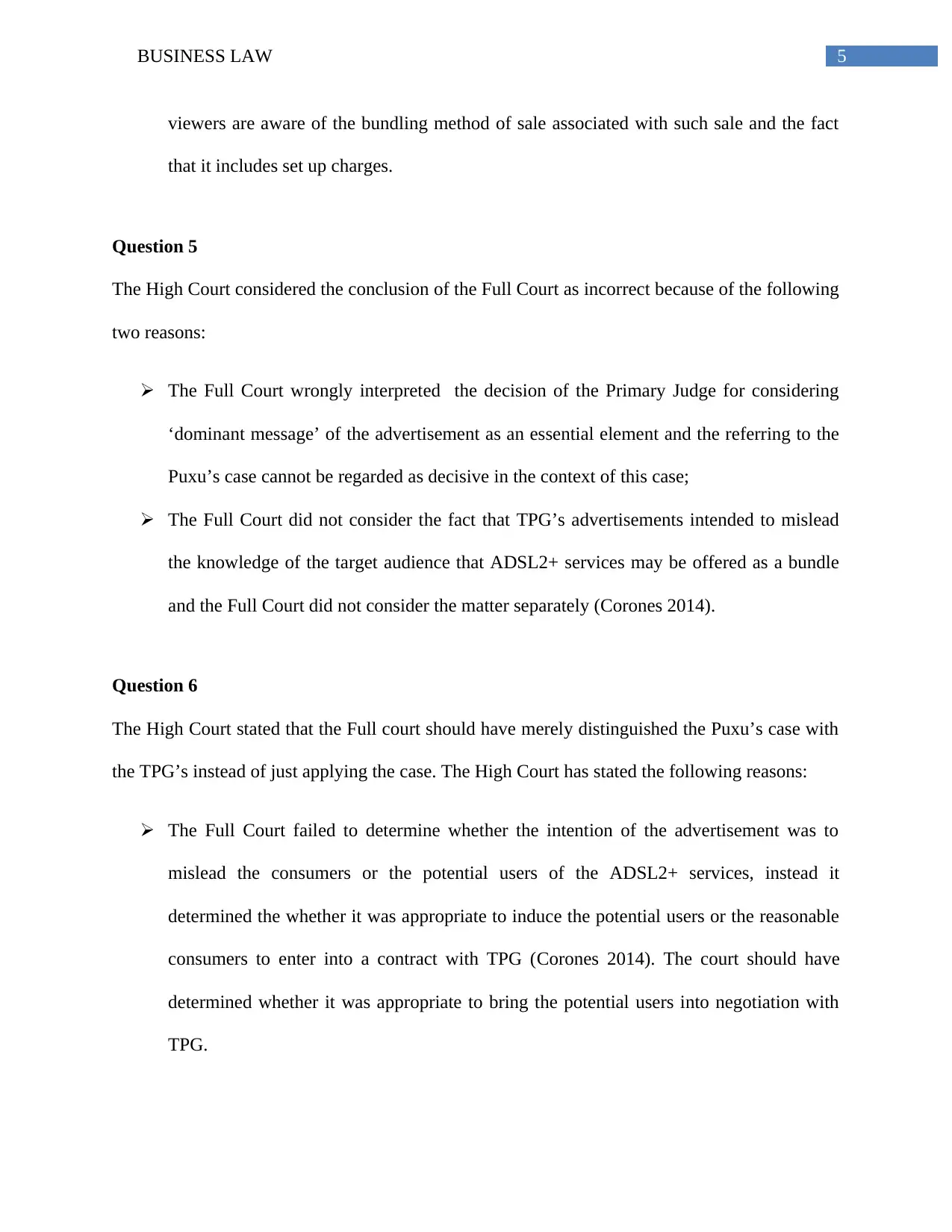
5BUSINESS LAW
viewers are aware of the bundling method of sale associated with such sale and the fact
that it includes set up charges.
Question 5
The High Court considered the conclusion of the Full Court as incorrect because of the following
two reasons:
The Full Court wrongly interpreted the decision of the Primary Judge for considering
‘dominant message’ of the advertisement as an essential element and the referring to the
Puxu’s case cannot be regarded as decisive in the context of this case;
The Full Court did not consider the fact that TPG’s advertisements intended to mislead
the knowledge of the target audience that ADSL2+ services may be offered as a bundle
and the Full Court did not consider the matter separately (Corones 2014).
Question 6
The High Court stated that the Full court should have merely distinguished the Puxu’s case with
the TPG’s instead of just applying the case. The High Court has stated the following reasons:
The Full Court failed to determine whether the intention of the advertisement was to
mislead the consumers or the potential users of the ADSL2+ services, instead it
determined the whether it was appropriate to induce the potential users or the reasonable
consumers to enter into a contract with TPG (Corones 2014). The court should have
determined whether it was appropriate to bring the potential users into negotiation with
TPG.
viewers are aware of the bundling method of sale associated with such sale and the fact
that it includes set up charges.
Question 5
The High Court considered the conclusion of the Full Court as incorrect because of the following
two reasons:
The Full Court wrongly interpreted the decision of the Primary Judge for considering
‘dominant message’ of the advertisement as an essential element and the referring to the
Puxu’s case cannot be regarded as decisive in the context of this case;
The Full Court did not consider the fact that TPG’s advertisements intended to mislead
the knowledge of the target audience that ADSL2+ services may be offered as a bundle
and the Full Court did not consider the matter separately (Corones 2014).
Question 6
The High Court stated that the Full court should have merely distinguished the Puxu’s case with
the TPG’s instead of just applying the case. The High Court has stated the following reasons:
The Full Court failed to determine whether the intention of the advertisement was to
mislead the consumers or the potential users of the ADSL2+ services, instead it
determined the whether it was appropriate to induce the potential users or the reasonable
consumers to enter into a contract with TPG (Corones 2014). The court should have
determined whether it was appropriate to bring the potential users into negotiation with
TPG.
⊘ This is a preview!⊘
Do you want full access?
Subscribe today to unlock all pages.

Trusted by 1+ million students worldwide
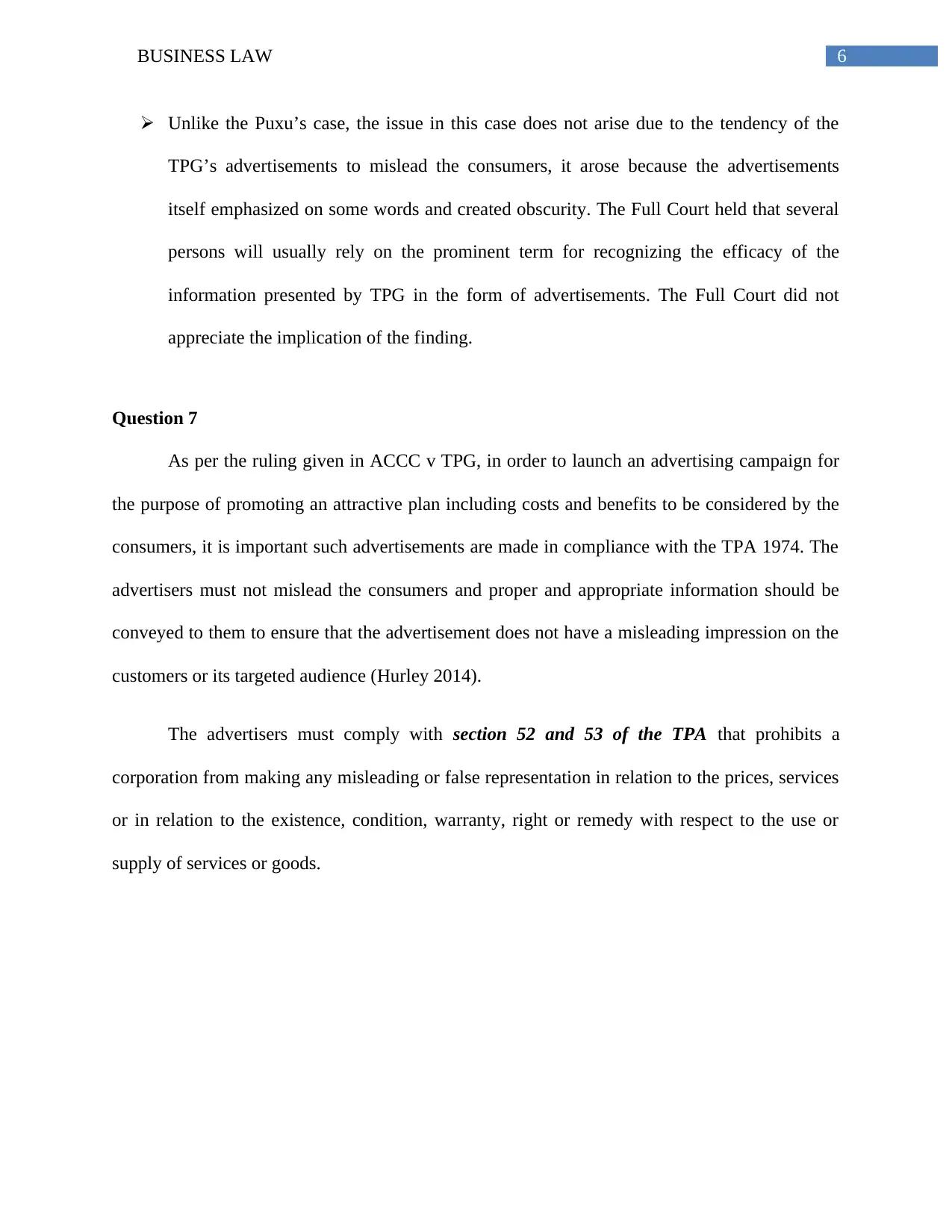
6BUSINESS LAW
Unlike the Puxu’s case, the issue in this case does not arise due to the tendency of the
TPG’s advertisements to mislead the consumers, it arose because the advertisements
itself emphasized on some words and created obscurity. The Full Court held that several
persons will usually rely on the prominent term for recognizing the efficacy of the
information presented by TPG in the form of advertisements. The Full Court did not
appreciate the implication of the finding.
Question 7
As per the ruling given in ACCC v TPG, in order to launch an advertising campaign for
the purpose of promoting an attractive plan including costs and benefits to be considered by the
consumers, it is important such advertisements are made in compliance with the TPA 1974. The
advertisers must not mislead the consumers and proper and appropriate information should be
conveyed to them to ensure that the advertisement does not have a misleading impression on the
customers or its targeted audience (Hurley 2014).
The advertisers must comply with section 52 and 53 of the TPA that prohibits a
corporation from making any misleading or false representation in relation to the prices, services
or in relation to the existence, condition, warranty, right or remedy with respect to the use or
supply of services or goods.
Unlike the Puxu’s case, the issue in this case does not arise due to the tendency of the
TPG’s advertisements to mislead the consumers, it arose because the advertisements
itself emphasized on some words and created obscurity. The Full Court held that several
persons will usually rely on the prominent term for recognizing the efficacy of the
information presented by TPG in the form of advertisements. The Full Court did not
appreciate the implication of the finding.
Question 7
As per the ruling given in ACCC v TPG, in order to launch an advertising campaign for
the purpose of promoting an attractive plan including costs and benefits to be considered by the
consumers, it is important such advertisements are made in compliance with the TPA 1974. The
advertisers must not mislead the consumers and proper and appropriate information should be
conveyed to them to ensure that the advertisement does not have a misleading impression on the
customers or its targeted audience (Hurley 2014).
The advertisers must comply with section 52 and 53 of the TPA that prohibits a
corporation from making any misleading or false representation in relation to the prices, services
or in relation to the existence, condition, warranty, right or remedy with respect to the use or
supply of services or goods.
Paraphrase This Document
Need a fresh take? Get an instant paraphrase of this document with our AI Paraphraser
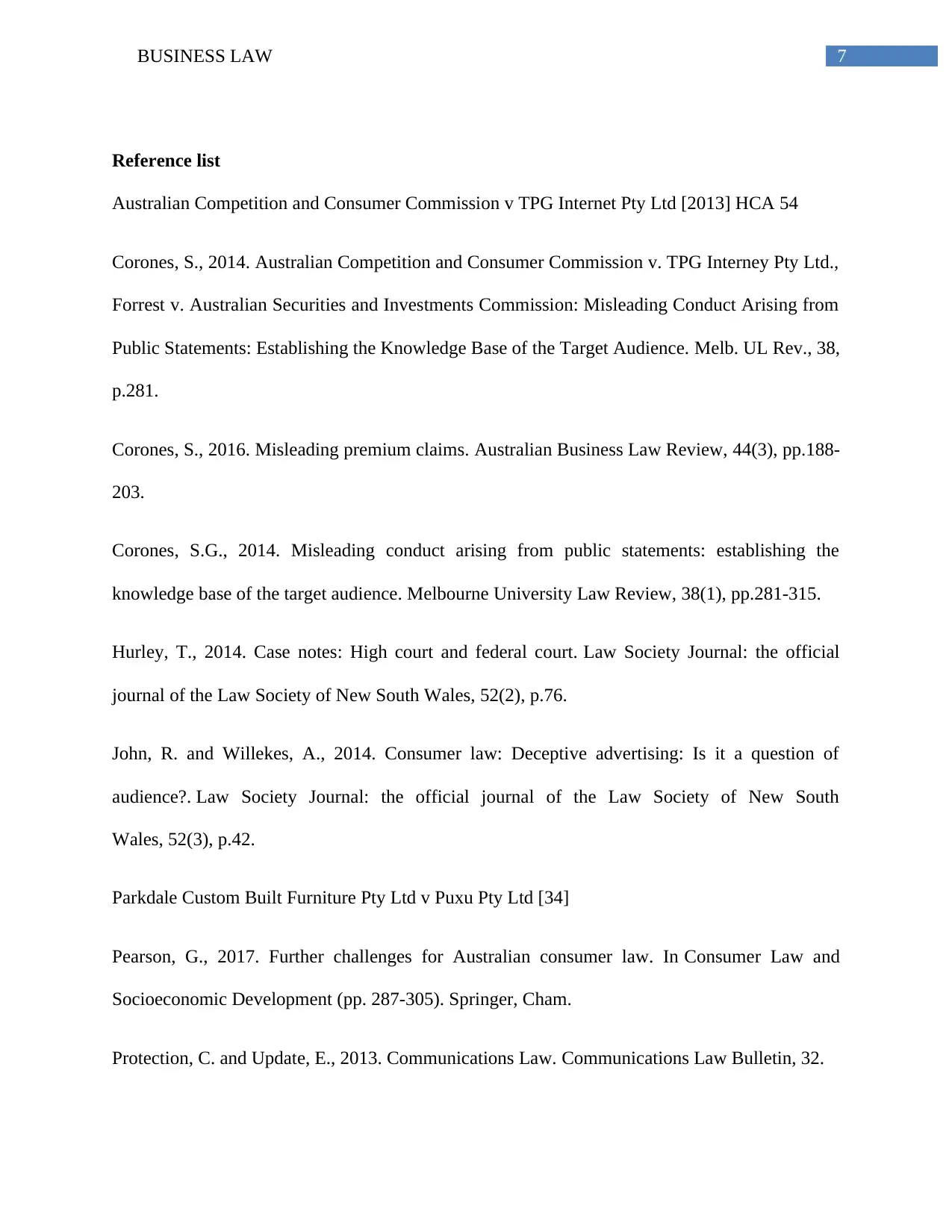
7BUSINESS LAW
Reference list
Australian Competition and Consumer Commission v TPG Internet Pty Ltd [2013] HCA 54
Corones, S., 2014. Australian Competition and Consumer Commission v. TPG Interney Pty Ltd.,
Forrest v. Australian Securities and Investments Commission: Misleading Conduct Arising from
Public Statements: Establishing the Knowledge Base of the Target Audience. Melb. UL Rev., 38,
p.281.
Corones, S., 2016. Misleading premium claims. Australian Business Law Review, 44(3), pp.188-
203.
Corones, S.G., 2014. Misleading conduct arising from public statements: establishing the
knowledge base of the target audience. Melbourne University Law Review, 38(1), pp.281-315.
Hurley, T., 2014. Case notes: High court and federal court. Law Society Journal: the official
journal of the Law Society of New South Wales, 52(2), p.76.
John, R. and Willekes, A., 2014. Consumer law: Deceptive advertising: Is it a question of
audience?. Law Society Journal: the official journal of the Law Society of New South
Wales, 52(3), p.42.
Parkdale Custom Built Furniture Pty Ltd v Puxu Pty Ltd [34]
Pearson, G., 2017. Further challenges for Australian consumer law. In Consumer Law and
Socioeconomic Development (pp. 287-305). Springer, Cham.
Protection, C. and Update, E., 2013. Communications Law. Communications Law Bulletin, 32.
Reference list
Australian Competition and Consumer Commission v TPG Internet Pty Ltd [2013] HCA 54
Corones, S., 2014. Australian Competition and Consumer Commission v. TPG Interney Pty Ltd.,
Forrest v. Australian Securities and Investments Commission: Misleading Conduct Arising from
Public Statements: Establishing the Knowledge Base of the Target Audience. Melb. UL Rev., 38,
p.281.
Corones, S., 2016. Misleading premium claims. Australian Business Law Review, 44(3), pp.188-
203.
Corones, S.G., 2014. Misleading conduct arising from public statements: establishing the
knowledge base of the target audience. Melbourne University Law Review, 38(1), pp.281-315.
Hurley, T., 2014. Case notes: High court and federal court. Law Society Journal: the official
journal of the Law Society of New South Wales, 52(2), p.76.
John, R. and Willekes, A., 2014. Consumer law: Deceptive advertising: Is it a question of
audience?. Law Society Journal: the official journal of the Law Society of New South
Wales, 52(3), p.42.
Parkdale Custom Built Furniture Pty Ltd v Puxu Pty Ltd [34]
Pearson, G., 2017. Further challenges for Australian consumer law. In Consumer Law and
Socioeconomic Development (pp. 287-305). Springer, Cham.
Protection, C. and Update, E., 2013. Communications Law. Communications Law Bulletin, 32.
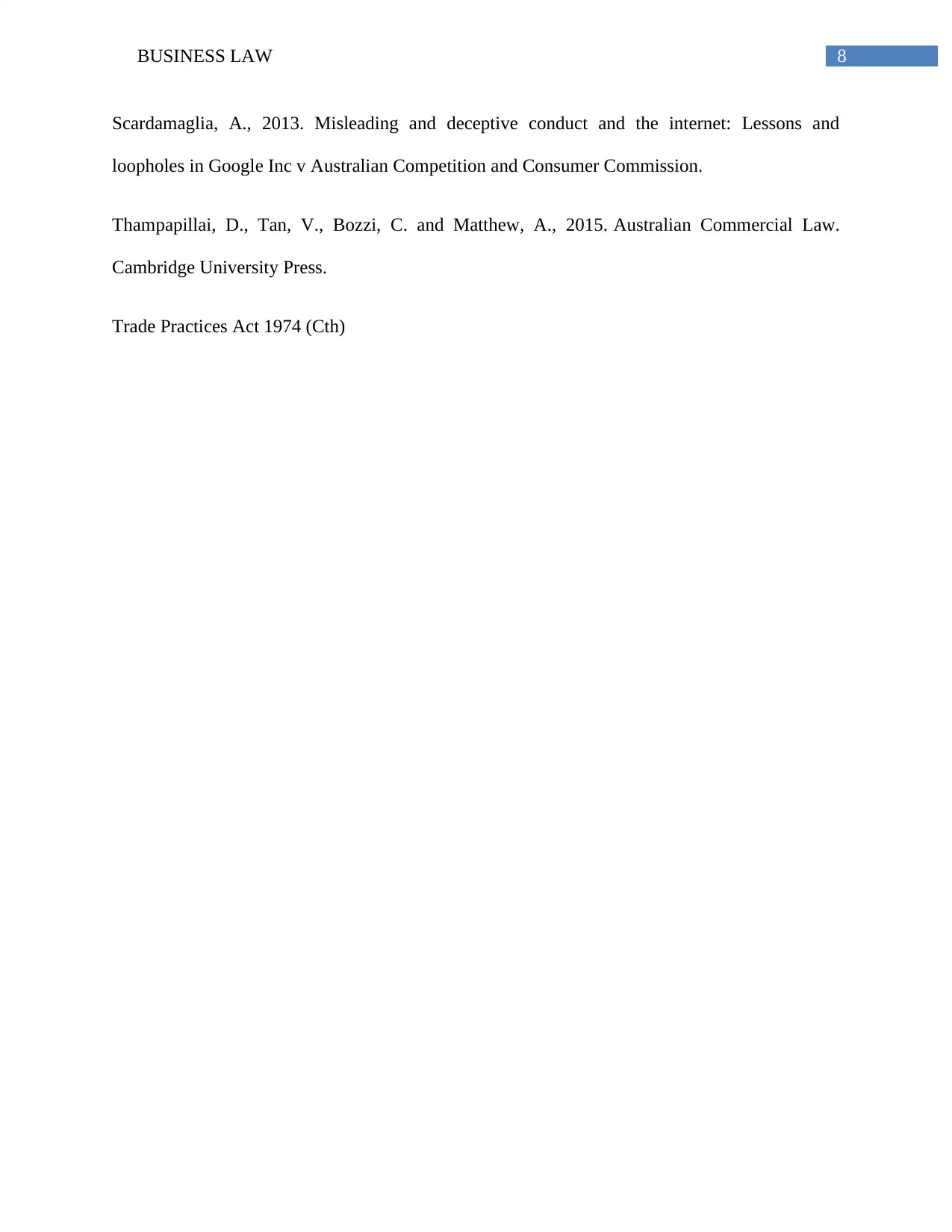
8BUSINESS LAW
Scardamaglia, A., 2013. Misleading and deceptive conduct and the internet: Lessons and
loopholes in Google Inc v Australian Competition and Consumer Commission.
Thampapillai, D., Tan, V., Bozzi, C. and Matthew, A., 2015. Australian Commercial Law.
Cambridge University Press.
Trade Practices Act 1974 (Cth)
Scardamaglia, A., 2013. Misleading and deceptive conduct and the internet: Lessons and
loopholes in Google Inc v Australian Competition and Consumer Commission.
Thampapillai, D., Tan, V., Bozzi, C. and Matthew, A., 2015. Australian Commercial Law.
Cambridge University Press.
Trade Practices Act 1974 (Cth)
⊘ This is a preview!⊘
Do you want full access?
Subscribe today to unlock all pages.

Trusted by 1+ million students worldwide
1 out of 9
Related Documents
Your All-in-One AI-Powered Toolkit for Academic Success.
+13062052269
info@desklib.com
Available 24*7 on WhatsApp / Email
![[object Object]](/_next/static/media/star-bottom.7253800d.svg)
Unlock your academic potential
Copyright © 2020–2026 A2Z Services. All Rights Reserved. Developed and managed by ZUCOL.





